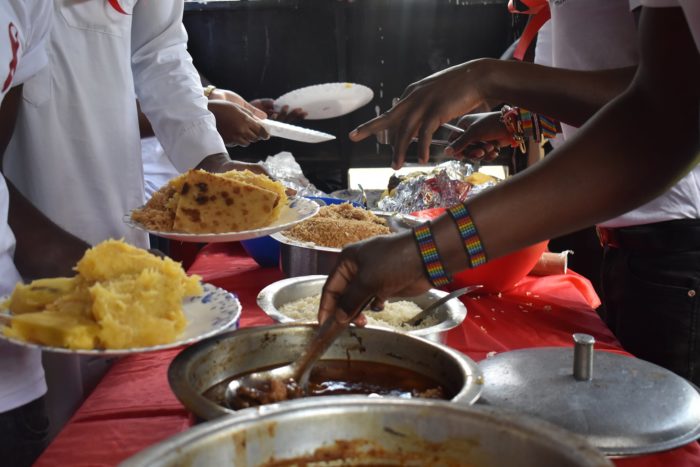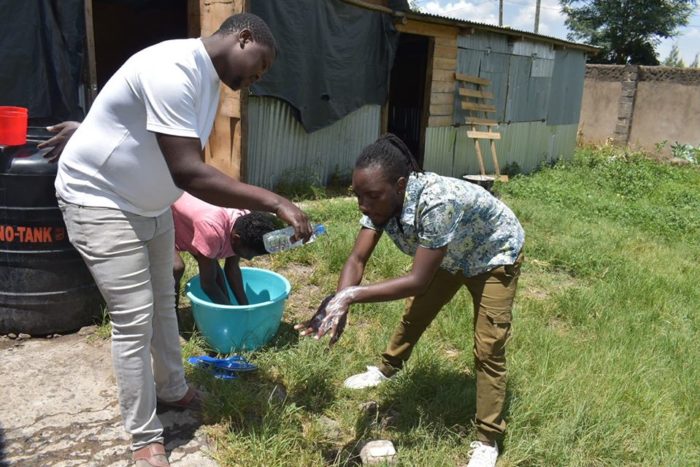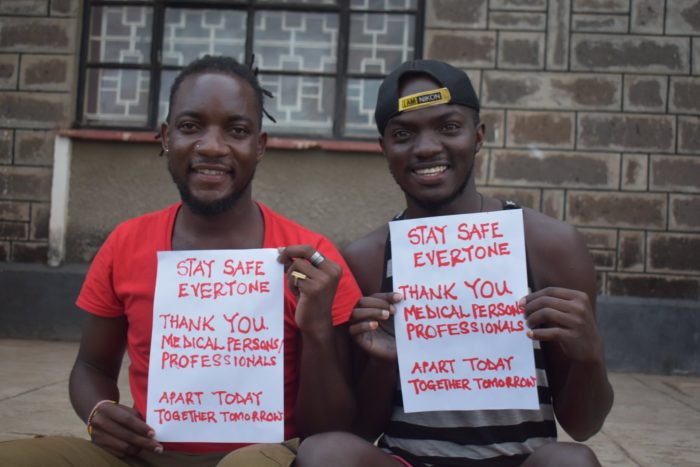East African LGBT Refugees and Resilience in the COVID-19 Crisis
This post was originally published on Sacred Queer Stories, a research project exploring the intersections of bible stories and the life stories of Ugandan LGBTI refugees. More specifically, it examines the potential of reclaiming the Bible and using it to signify the queer lives of LGBTI refugees in East Africa.
At the recent annual meeting of the American Academy of Religion, the AAR Committee for the Status of LGBTIQ Persons in the Profession convened a roundtable about “Creative Actions in Crises by Experienced Communities”. Inspired by the current COVID-19 pandemic, the idea for the conversation was to explore how marginalized individuals from diverse religious traditions and identity backgrounds respond to crises. What skills do they use to combat a given crisis and its effects? What utopian imaginings, or imaginings of an “otherwise,” do they offer? What innovations do they create that become part of the new normal?
Invited to speak on the panel, I decided to talk about one particular community that has been incredibly creative and inventive in responding to the COVID-19 pandemic and related challenges. This is the community of LGBT refugees based in Kenya, East Africa, which I’ve known since 2015, and with whom I’ve worked intensely in recent years, as part of the Sacred Queer Stories project, together with my colleague Johanna Stiebert. Focusing on the work of The Nature Network, a community-based refugee organisation in Nairobi, I discuss how, in a context of multiple vulnerabilities, this group had already developed skills and strategies that proved to be particularly adequate in the context of COVID.
Kenya hosts a community of hundreds of LGBT refugees from neighbouring countries, mostly from Uganda. Most of them are enrolled in a process of resettlement in a third country, administered by the United Nations refugee agency (UNHCR). However, this resettlement process is notoriously slow and can take years. In the meantime, community members experience double marginalisation in Kenya, because of their refugee status and their sexuality. They suffer from socio-economic marginalisation, as they are not allowed to work, and struggle to provide in their basic needs such as accommodation and food. They also risk harassment by the police as well as by neighbours and people in the communities where they live. In this context, a number of community-based organisations has emerged, in which groups of refugees have organized and sought to empower themselves. One of them is The Nature Network (TNN).
The Nature Network is a transgender-led organisation of and for refugees, founded in 2015. The Network runs a community house and resource centre on the outskirts of Nairobi, the capital city of Kenya. From there, they provide shelter and food to the resident refugees, offer support to other members of the refugee community, run livelihood programmes, develop social and economic skills, engage in community empowerment, and provide health education.
The work of the Nature Network centres around what they call, ‘family-based therapy’. This is a highly significant term. During the research we undertook in recent years, it struck me that many refugees who are part of the community refer to TNN as a family. Many of them have narrated how they were ostracized by their biological families back home in Uganda but have found a new family in the TNN community. As one community member writes on the TNN blog: ‘We love the family created at The Nature Network. It is a nurturing safe space. … We are so proud to have it, for it represents the best family ever in our lives.’ Clearly, this community presents a case of ‘queer kinship’ avant la lettre, providing a space of belonging, a space to feel at home, for people whose lives are in transit. During one visit, in September 2019, a flipchart paper was mounted on the wall, reading: ‘Blood does not make family. Those are relatives. Family are those with whom you share your good, bad and ugly, and still love one another in the end. Those are ones you select yourself.’ The quote illustrates the key point about queer kinship, as captured in the title of Kath Weston’s classic study, Families We Choose.[1] However, the case of TNN also complicates this notion of queer family based on voluntary choice, because the context in which this alternative family is established is one of forced migration to a foreign land and the related experience of social and economic marginalisation. Indeed, many of the stories that members told us testify to the pain and trauma that comes with being excluded from the biological family back in Uganda and losing touch with parents and siblings.

Pictured Above: Sharing food at the Nature Network
The sense of TNN as a family space has been methodologically incorporated in the programmes. The family-based therapy centres around the following pillars: mutuality, dialogue, dignity-affirmation, acceptance, inclusion and candid reflection. It translates into a holistic approach addressing the social, spiritual, and economic needs of refugees, and is concerned with promoting self-esteem and self-care. It also translates into participatory and democratic methods of community-building, in which every member is given responsibilities and is given a say in decision-making processes.
When the COVID-19 pandemic hit the world, early in 2020, the Kenyan government imposed strict lockdown measures in order to curb the spread of the virus. These measures, however, severely impacted mobility and economic activity, hindering people from being able to engage in income-generating activities. This hit refugees, among other economically marginalised communities in the country, particularly hard.
The Nature Network responded to the challenges of the pandemic with vision and dedication. They set up a social media campaign to create awareness of the disease among refugee communities, promoting prevention messages of handwashing, mask wearing, and social distancing. Building on the experience TNN already had with addressing health-related challenges faced by refugees, especially HIV and TB, the organisation was well-equipped to initiate this awareness campaign. Doing so, they adopted an intersectional approach that did not isolate COVID, but embedded it in a broader understanding of refugee health challenges.

Pictured Above: Handwashing at the Nature Network
As a result of the economic devastation caused by lockdown measures, many refugees struggled to pay for their accommodation. The number of residents at the Nature Network shelter doubled, if not tripled, in the course of 2020. Funds were raised to support refugees with food, medication and other essential needs. Building on previous experience, TNN also relaunched its livelihood programmes, such as rabbit and poultry farming, through which participating refugees could generate some income.
Just a few weeks ago, I saw a photo of a passage from the Bible on the TNN Facebook page. When I inquired about its background, I was told that they had used this story from the Gospel of Mark (3: 7-12) as part of their community prayer and bible study meeting that week. Interestingly, this story tells about Jesus healing people, and then about Jesus avoiding the crowds by seeking refuge on a small boat. In a creative way, the story had been used to address two questions that are critical in the context of COVID-19: the possibility of religious healing, and the importance of social distancing. I was particularly pleased to see this method being used, because the project we have done with TNN was about using the Bible as a resource for addressing the specific challenges and experiences of LGBT refugees. About a year after our last contextual Bible study, they continued to use this method on their own initiative.
To conclude, it appears that the Nature Network was particularly well-positioned to face the challenges posed by COVID-19, because they are a community that is experienced in using creative actions in the face of crises. This is demonstrated by their holistic approach that acknowledges the intersectionality of the difficulties faced by LGBT refugees. The organisation further exemplifies queer resilience and inventiveness. The world in which they live is hostile, yet they engage in creative world-making practices through which they create themselves a protective and affirming space.
The queer scholar José Esteban Muñoz has stated that “Queerness is essentially about the rejection of a here and now, and an insistence on potentiality or concrete possibility for another world.”[2] The Nature Network, by providing an alternative family to LGBT refugees, rejects and resists the status quo of marginalization, and in a very concrete way exemplifies another world possible.

Pictured Above: The Nature Network, COVID-19 campaign
Written By: Prof. Adriaan van Klinken, originally posted here.
Image Credits: The Nature Network for feature image and Prof. Adriaan van Klinken for in-text photos.
[1] Kath Weston, Families We Choose: Lesbians, Gays, Kinship, revised edn. (New York: Columbia University Press, 1997).
[2] José Esteban Muñoz, Cruising Utopia: The Then and There of Queer Futurity, New York: New York University Press, 2009), 1.
